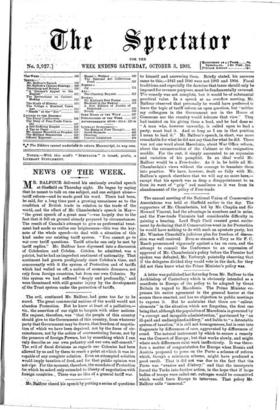'Mr t rFelfeur , closed his speech by putting a. series of questions
to himself and answering them. Briefly stated, his answers came to this,-1845 and 1846 were not 1903 and 1904. Fiscal traditions, and especially the doctrine that taxes should only be imposed for revenue purposes, must be fundamentally reversed. The remedy was not complete, but it would be of substantial practical value. In a speech at au overflow meeting, Mr. B,alfour observed that personally he would have preferred tc leave the topic of tariff reform an open question, but "neithet my colleagues in the Government nor in the House of Commons nor the country would tolerate that view." They had insisted on his giving them a lead, and he had done so "A man who, however unworthy, is called upon to lead a party, must lead it. And so long as I am in that position I mean to, lead it." Mr. Balfour's speech, in short, was more remarkable for what he did not say than for what he did. There was not one word about Macedonia, about War Office reform, about the reconstruction of the Cabinet or the resignation muddle. For the rest, it simply amounted to an expansion and variation of his pamphlet. In an ideal world Mr. Balfour would be a Free-trader. As it is, he holds all Mr. Chamberlain's views without the courage to translate them into practice. We have, however, dealt so fully with. Mr. Balfour's speech elsewhere that we will say no more here,— except that his speech was as deep a disappointment to us from its want of " grip " and manliness as it was from its abandonment of the policy of Free-trade.


























































 Previous page
Previous page